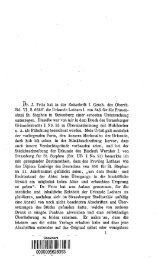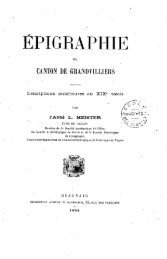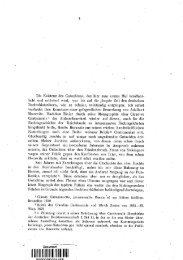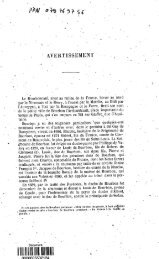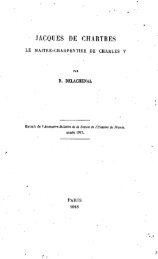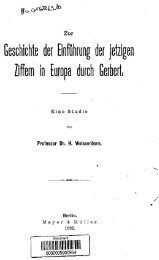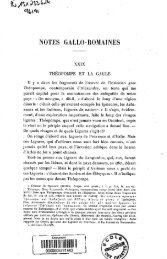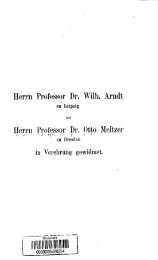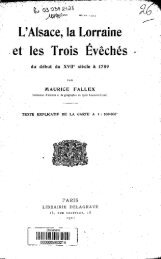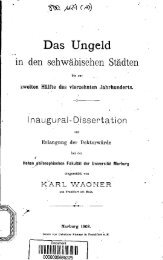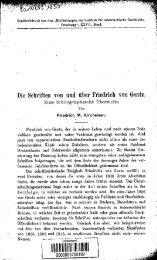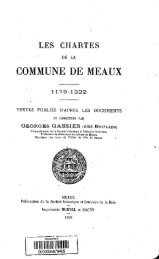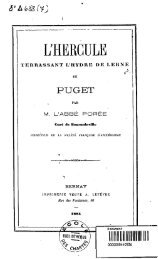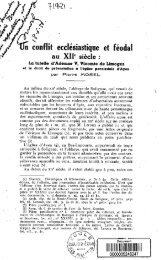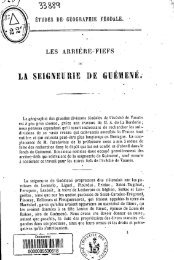4P Li gç(' TRANSACTIONS
4P Li gç(' TRANSACTIONS
4P Li gç(' TRANSACTIONS
Create successful ePaper yourself
Turn your PDF publications into a flip-book with our unique Google optimized e-Paper software.
VOL. 47, PT. 5, 19571 ORESME'S VERSION AND ENGLISH TRANSLATION 845<br />
aussi bon semblant as parens de elle comme as siens ou<br />
plus. Et ne est pas ypocrisie ne falseté, mes est bienfait.<br />
Et est par cc nianifestee l'amisté quil a a sa femme. Et<br />
semblablement doit faire la femme as parens de son man.<br />
Et cc est Ic premier enseignenient de cest chapitre.<br />
T. Item, ii doivent faire qu'il aient aussi comme commune<br />
cure et solicitude de leur filz et enfans et (IC leur<br />
amis et de toute Ia maison.<br />
G. Car toutes les grandes choses sunt communes a l'un<br />
et a l'autre, mes plus pnincipalnient appartiennent ou man.<br />
T. Item, que chescun des .ii. s'efforce et mette cure<br />
et peine a passer l'autre en ce qu'il soit cause que plus<br />
de biens soient fais par lui au commun profit de la<br />
maiSon et que chescun se peine de estre le melleur et Ic<br />
plus juste.<br />
G. Et qe un ne se atende on excuse en nien de l'autre<br />
en leissant a faire bien, mes face chescun a son povoir le<br />
miex, non pas pour envie, mes pour jalousie de vertu et<br />
de justice.<br />
T. Item, que chescun leisse orgueil et gouverne la<br />
maison a droit et ait maniere humble et debonnaire.<br />
G. Cc dit it afin que nul des manes ne se donne gloire<br />
par sus l'autre pour cc se it a // (347c) fait aucun grant<br />
bien, mes tousjours repute que encor deust il miex faire et<br />
que I'autre fait miex. Apres it met la fin pourquoy Fen<br />
doit gander telz enseigneniens.<br />
7'. Afin que quant it vendront en villece et ii seront<br />
delivrés du benefice.<br />
C. Cc est a dire, quant it ne pourront plus estre bienfaicteurs<br />
a leur farnille ne leur faire profit.<br />
T. Et de mout de cures et de concupiscences et de<br />
desiriers charnelz qui sunt faiz aucune foiz en joennece,<br />
ii aient a respondre Fun a l'autre et a leur filz ou enfans<br />
lequel des .ii. a esté cause de pluseurs biens en Ia maison<br />
dont chescun des .ii. a esté fait recteur et gouverneur.<br />
G. Et que ceste altercation ne soit pas contencieuse telement<br />
que chescun se repute avoir fait plus de biens, mes<br />
que elle soit gracieuse et que chescun attribue a l'autre<br />
avoir fait plus dc biens.<br />
T. Et clue Fen puisse savoir tantost oti comment le<br />
mal qui seroit avenu avroit esté par fortune et le bien<br />
par vertu.<br />
C. Se aucun mal est advenu ou gouvernement d'ostel les<br />
enfans doivent supposer que cc ne est pas par Ic vice des<br />
parens et les parens aussi l'un de l'autre, mes que cc a esté<br />
par infortune. Ft Ic bien qui est avenu, les cnfans Ic doivent<br />
attribuer a la vertu des parens et le mari a la vertu<br />
de la femme et la femme a Ia vertu du man.1<br />
T. Es quelles choses qui avra vescu, il en raportera<br />
et avra des diex tres grant merite.<br />
C. En on texte est qui vixen!, cc est assavoir, qui vivra<br />
/ (347d) en bonnes ocvres. Et tin autre texte est qui<br />
vicerit, cc est a (lire, qui avra victoire en faisant plus de<br />
biens ou victore sus les infortunes par vertu et par pa-<br />
treat her parents as well as his own or better. And this<br />
is not hypocrisy or falseness, but is quite fitting. And in<br />
this way he makes manifest his love for his wife. The wife<br />
should conduct herself likewise with her husbands parents.<br />
And this is the first precept of this chapter.<br />
T. Moreover, they must share mutually in the care<br />
and attention to be given their children, their friends,<br />
and the entire household.<br />
Cr, For all major interests are common to each, but are<br />
especially the husbands responsibility.<br />
T. Each must vie with the other and seek diligently<br />
to surpass the other in contributing his share to the<br />
common good of the household and each should try to<br />
excel in goodness and justice.<br />
C. And neither should wait upon the other's action nor<br />
seek any excuse for failure to do right; each should do his<br />
best, not from enviousness, but because he is jealous of<br />
virtue and justice.<br />
T. Let each one cast aside his pride and seek to<br />
govern the household justly and let him be humble and<br />
unassuming in manner.<br />
G. This he says in order that neither one should lord<br />
it over the other because he has // (347c) accomplished<br />
some notable action; rather, let him consider that he should<br />
have done still better and that the other does better than<br />
he. Next lie states the reason for observing such precepts.<br />
T. So that when 01(1 age comes upon them and they<br />
can no longer provide for others.<br />
C. That is, when they will be no longer able to provide<br />
for their family or to enhance its well-being.<br />
T. And are released from many of their duties and<br />
from preoccupation with the lusts and carnal desires<br />
common to youth, they may be able to recount to each<br />
other and to their children which one of them has contributed<br />
more benefits to the home in which each has<br />
served as director and governor.<br />
C. And this controversy need not be angrily contentious<br />
to the point that each makes claim to have done more good<br />
things than the other ; rather, it should be an affable, polite<br />
exchange in which each contends that the other has contributed<br />
most to the common welfare.<br />
7'. And it should appear quite clearly that the ills<br />
that have befallen them have been due to fortune and<br />
that the good was due to their own virtue.<br />
C. If any misfortune has attended their management of<br />
the household, the children should believe that this was in<br />
no way attributable to the sins of the parents. And likewise<br />
the parents should not blame each other, but rather<br />
hold that it was caused by bad fortune. And whatever<br />
good has come to the family the children must attribute to<br />
their parents' virtue and the husband to the wife and the<br />
wife to the husband.<br />
7'. One who has lived through these things will win<br />
great merit from the gods.<br />
C. In one text the passage reads qui vixen!, that is,<br />
who will live (347d) in good works; in another text it<br />
reads qui z'iccrit, who will have victory in excess of good<br />
deeds or victory over had fortune by his virtue and patience.



